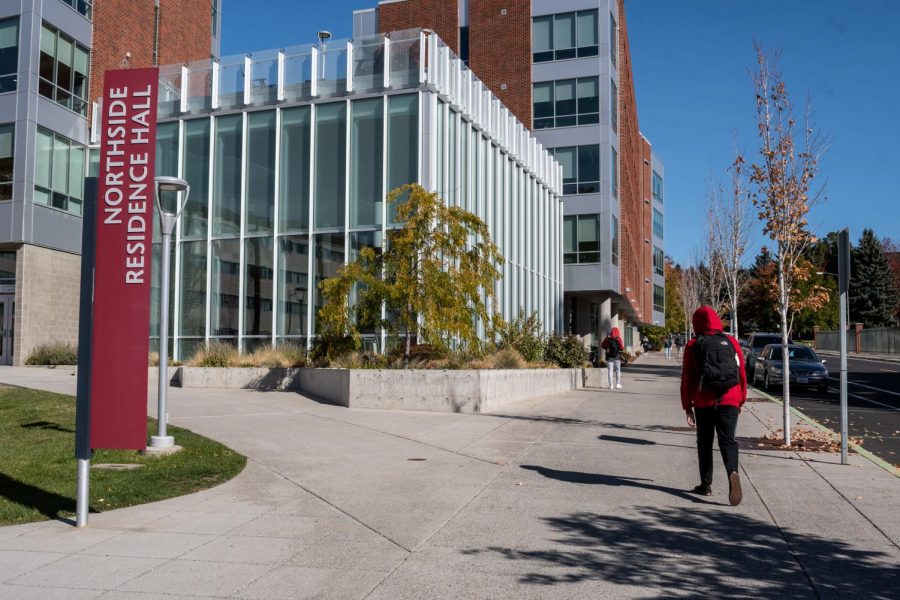RHA votes to approve 2% residence hall increase fee
The bill was approved by a majority vote of 67%
Northside Residence Hall, October 13, 2021.
February 28, 2023
The WSU Residence Hall Association voted to approve a resolution for a 2% residence hall fee increase for the upcoming fall semester on Jan. 23. The bill was approved by a majority vote of 67% and will now be sent to the WSU Housing and Dining Board for further approval.
The enhancement fee would bring in approximately $750,000 a year, all of which will go towards a renovation fund for several residence halls on campus.
The enhancement fee will allow for students to decide themselves what they want to be improved. This could include anything from purchasing furniture for common areas to updating the shared spaces in the buildings such as the showers or kitchens, Bryz-Gornia said.
RHA President Tyler Nielsen, who penned the bill, said that the purpose of the enhancement fee is to remedy the disparity of living quality in the residence halls. He said that some dorms have not been renovated for many years and do not receive sufficient funding to provide quality living experiences to their residents.
In order to maintain equitable living costs, students would be required to pay the increased fee of 2% in relation to their current housing fees. The fee would only be paid by students living in the residence halls on campus, so those residing in on-campus apartments or off-campus housing would be exempt from the fee.
Nielsen said any residence halls that have been constructed in the past 20 years or which have received renovations in the past five years will be ineligible to receive funding for enhancements until their waiting period has ended. These include Global Scholars Hall, Northside, Olympia and Community Duncan/Dunn.
While a fund already exists for improvements to the residence halls, these funds typically go toward necessary changes, such as maintenance or recovery from vandalism or damages.
The money from the preexisting budget can never go towards renovations to the residence halls for this reason, which is what inspired the idea for a student-run improvement fund, Nielsen said.
Emmett Bryz-Gornia, vice president of Leadership and Development of the RHA, reflected on his time in Stephenson Hall last year, saying, “We know that there’s a disparity between our base-level halls I was in and our top-tier halls, like Global Scholars.”
Remedying minor fixable issues in the buildings, such as leaky shower heads or flickering light bulbs can help significantly improve the quality of life experienced by the residents in those halls, Bryz-Gornia said.
“That was the spirit of the bill,” he said. “Was to try to help dorms that hadn’t had renovations in quite some time have little things that can improve their experience here.”
Bryz-Gornia said that the goal is for students to have a voice when it comes to improvements to the residence halls. Residents will be able to bring ideas for changes to their floor representatives, who will then vote on whether those changes should be implemented to the building or not. Then the proposal will be voted on by the RHA, which will decide whether or not the project for that building should be pursued that year, after which funding will be allocated to the hall.
“It wouldn’t be for multiple in one year,” Nielsen said in regard to intended project completions. “We’d focus on one residence hall per year.”
Students at residential colleges achieve higher grades and complete more credit hours each semester in comparison to other institutions. However, this may be impacted by the lower quality of living experienced by residents in the dorms, according to the WSU Housing website
“There shouldn’t be such a huge disparity amongst living standards,” said Margaret Charboneau, an RHA representative for Streit Perham Hall who voted in favor of the resolution.
“I know here in my hall specifically, I’ve had people move out last semester and this semester because when it rains, their stuff gets water damage because the windows aren’t insulated properly,” she said. “That doesn’t happen in Global.”
The RHA intends to enact the expanding fee by the beginning of the fall 2023 semester. The resolution has been sent to the WSU Housing and Dining Board for further approval and will also need to be passed by the Board of Regents before it can be enacted.









